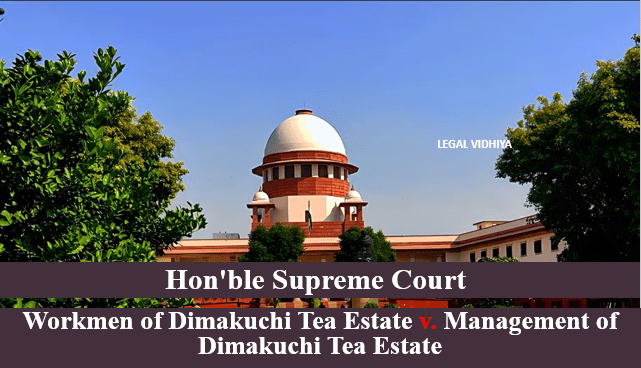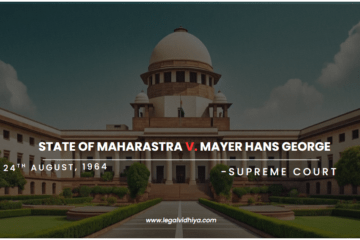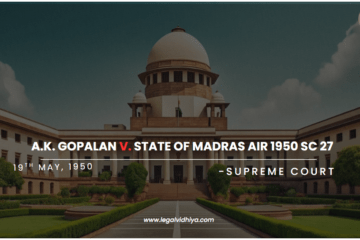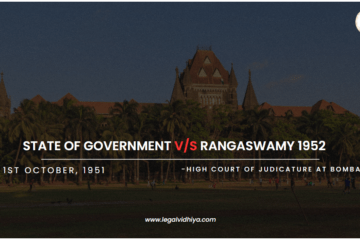
Citation | 1958 AIR 353,1958 SCR 1156 |
Date of Judgement | 4 February 1958 |
Court | Supreme Court Of India |
Case Type | Civil Original Jurisdiction |
Petitioners | Workmen of Dimakuchi Tea Estate |
Respondent | The Management of Dimakuchi Tea Estate |
Bench | Sudhi Ranjan DasS.K. DasA.K. Sarkar |
Referred | Article 136 of the Indian ConstitutionSection 2 of the Industrial Dispute Act, 1947 |
FACTS:
The appellant’s workmen of the Dimakuchi tea estate are represented by Assam Chah Karmachari Sangha, Dibrugarh, and the respondent is the management of the Dimakuchi tea estate, district Darrang in Assam.
Dr. K.P. Banerjee was appointed Assistant Medical Officer at the Dimakuchi tea estate. He was hired subject to a satisfactory medical report and a three-month probation period during which his suitability for permanent employment would be evaluated. If he were deemed unsuitable for employment, he would be given seven days’ written notice to terminate his position. If he were found guilty of misconduct, he would be fired immediately. In February 1951, a year after Dr. Banerjee was appointed, he was given an increase in salary of Rs. 5 per month, but then he received a letter from Mr. Booth, the manager of the tea estate, stating that his services had been terminated but that he would receive one month’s salary in lieu of notice. When he inquired about the reasons, he was told they were medical and out of Mr. Booth’s jurisdiction. However, the primary reason included the deceptive manner in which he added figures to the requirements of the previous medical indent after Dr. Cox signed it.
The Mangaldai Circle of the Assam Chah Karmachari Sangha then took up Dr. Banerjee’s issue, and the secretary of that Sangha wrote to the manager of the Dimakuchi tea estate, inquiring about the reasons for Dr. Banerjee’s discharge. The manager responded by saying that Dr. K. P. Banerjee had been discharged due to incompetence in his medical duties and that the chief medical officer (Dr. Cox) had determined that Dr. Banerjee was incompetent and lacked sufficient knowledge of simple microscopical and laboratory work that is routinely associated with the job.
It was also claimed that Dr. Banerjee administered a faulty, inexperienced, and clumsy quinine injection to one Mr. Peacock, an assistant at the Dimakuchi tea estate, resulting in a highly acute and severe illness nearly paralyzing the patient’s leg. The reasons given by the manager for terminating Dr. K. P. Banerjee’s services did not satisfy the appellants herein, and certain conciliation proceedings were unsuccessfully held over the question of Dr. Banerjee’s termination of service. The Government then held the opinion to refer the matter to the Tribunal constituted under The Industrial Disputes Act, 1947 under Section 7.
Both the parties then submitted their written statements to the Tribunal, but it was held that since Mr. Banerjee was not a ‘workman,’ his issue did not fall within the ambit of ‘industrial dispute’ and hence was outside the jurisdiction of the court, and no relief could be granted. This decision was also upheld when an appeal was made to the Labor Appellate Tribunal of India, Calcutta. Therefore, the appellants then moved to the Supreme Court under Article 136 of the Indian Constitution for special leave.
ISSUES
Whether an issue by a person who is not a workman falls within the scope of the Industrial Dispute Act, 1947 and is covered under the ambit of the definition given under Section 2(k) under the Act.
ARGUMENTS
The appellants contended that the definition under Section 2 (k) can be easily divided into three parts- firstly, there must be a dispute or differences; secondly, this dispute must be between employers or workmen and lastly, this dispute must be related to the employment; terms of employment; non-employment; or with the conditions of the labor. Therefore, the appellants stated that the first and second part of the definition is satisfied since clearly, the dispute was concerning the termination of service of Dr. K. P. Banerjee, and this dispute was between the employer, who is the Dimakuchi tea estate. In the third part of the sentence, the appellants contended that the words “any person” mentioned in the definition clause must not be equated to “any workmen,” therefore the dispute clearly falls within the ambit of industrial dispute since the dispute was concerned with the non-employment of the appellant with the employers.
JUDGEMENT
The court held that the words “any person” under the definition clause must be read with certain limitations
- The dispute must be real and capable of resolution by way of settlement or adjudication to provide relief.
- The dispute which arose must be concerned with the one employment, non-employment, terms of employment, or labor conditions and it must be of substantial interest
As a result, the words “any person” cannot have their broadest meaning, as this would create inconsistency and repugnancy in the Act’s provisions. Chief Justice S.R. Das agreed with the reasoning presented. Consequently, it was determined that Dr. K.P. Banerjee was not a ‘workman’ but a medical or technical staff member, which was a different category from laborers. Hence the appellants had no direct or substantial interest in the employment or non-employment. Even if it was assumed that the appellant was a member of the Trade Union, it could not be established according to the tests laid down that dispute which arose regarding the termination of his service to be an industrial one falling with the ambit of Section 2(k) of the definition clause established under the Industrial Dispute Act, 1947. Therefore, by the majority decision of Chief Justice S.R. Das and Justice S.K. Das the appeal was dismissed.
REFERENCES
- https://www.legalservicesindia.com/article/822/Workmen-Of-Dimakuchi-Tea-Estate-V.-The-Management-of-Dimakuchi-Tea Estate.html#:~:text=If%20the%20workmen%20have%20no,at%20from%20a%20different%20perspective.
- https://www.lawcolumn.in/workmen-of-dimakuchi-tea-estate-v-the-management-of-dimakuchi-tea-estate-air-1958-sc-353/#google_vignette
- https://indiankanoon.org/doc/1198151/
This article is written by Sanjana Ramesh of Himachal Pradesh National Law University Shimla, an intern at Legal Vidhiya.




0 Comments